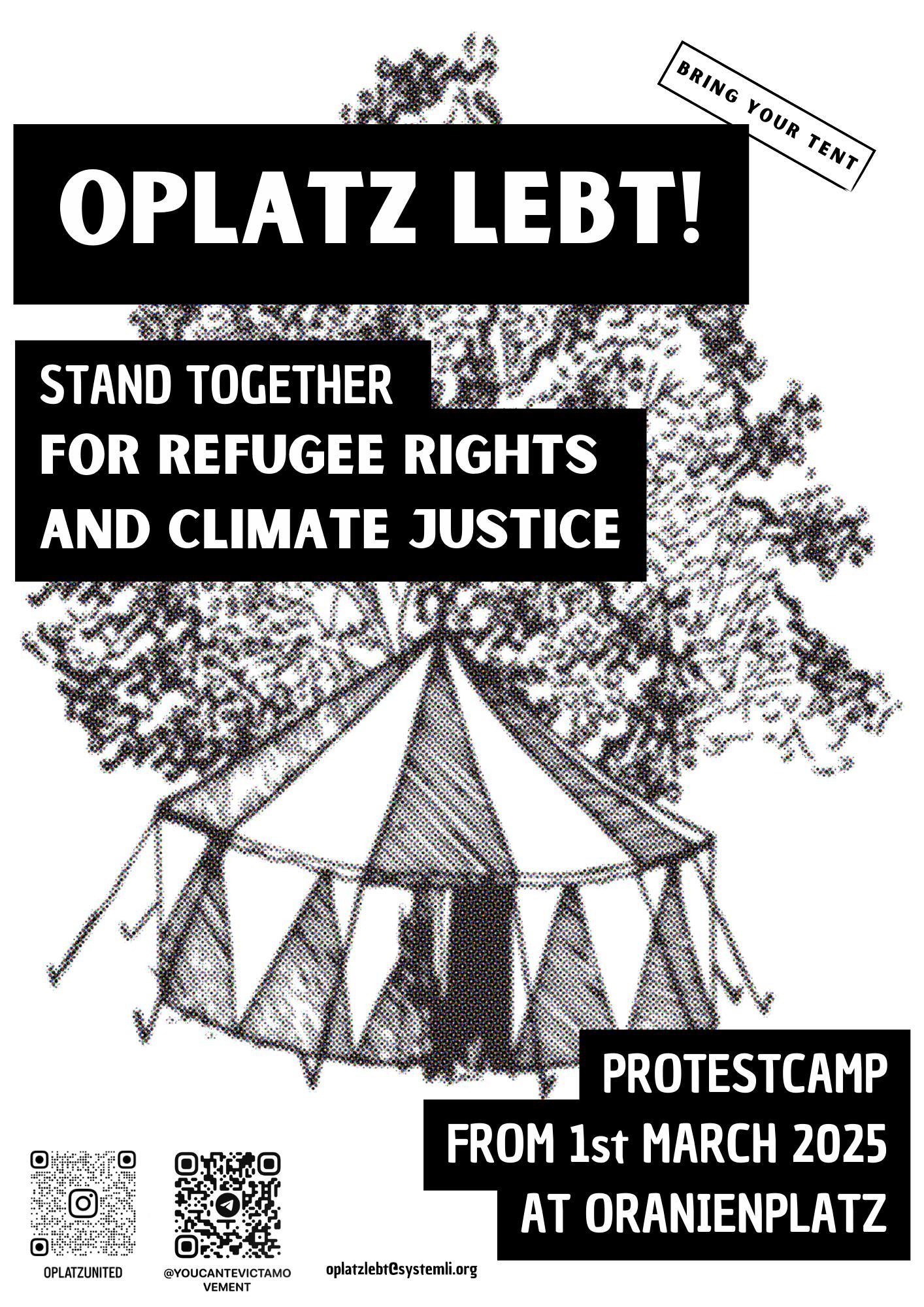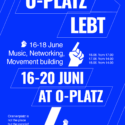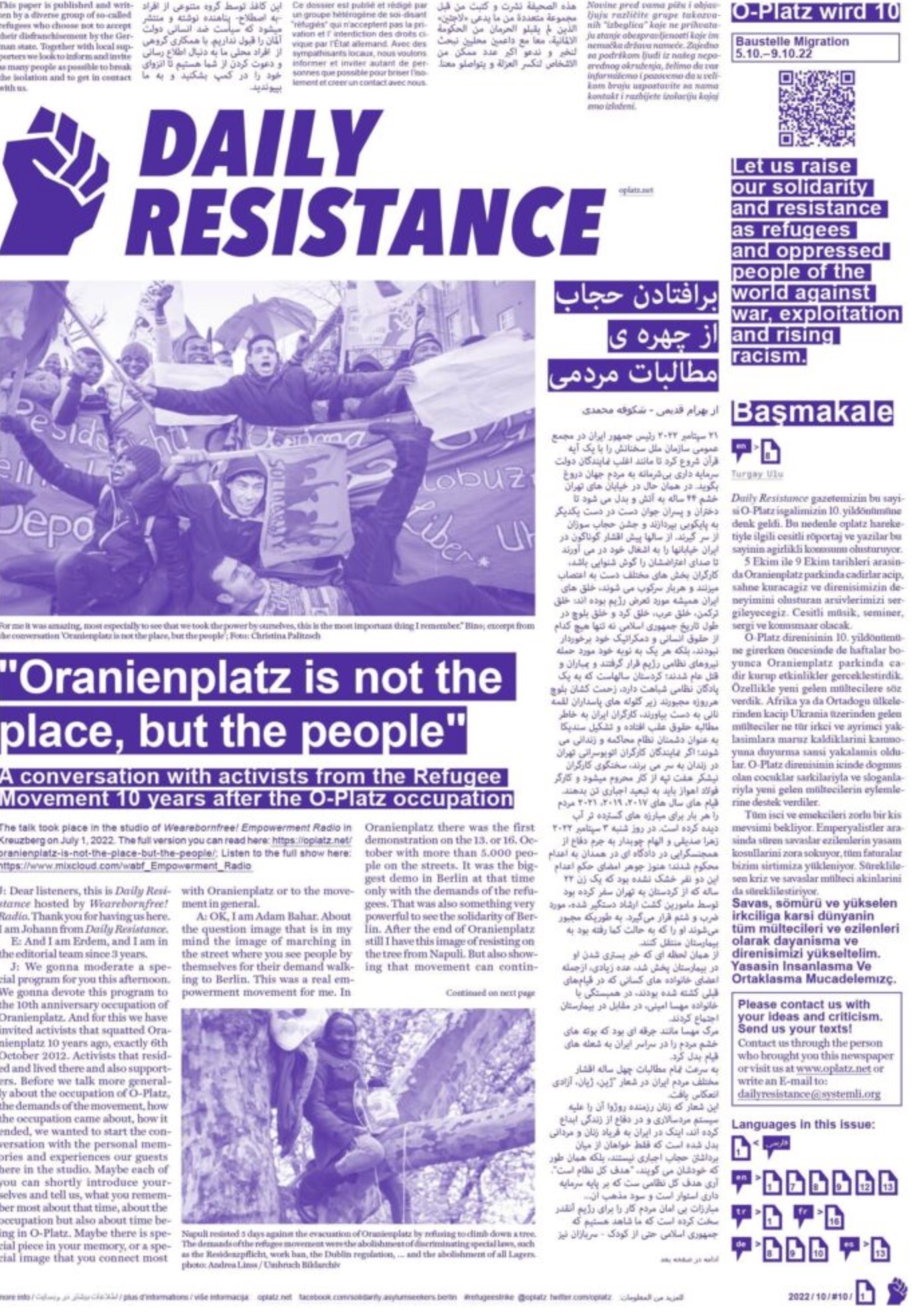Tag: Oranienplatz
-

Daily Resistance #11 is out!
Finally, a new issue of Refugee Activists’ Newspaper Daily Resistance has been released – this time as a wallpaper in 12 A3 sheets that can be glued and taped to the wall. As always, it comes in many languages (French, Arabic, Farsi, Turkish, English, German, Russian). The issue features the new protest camp at O-Platz,…
-

O-Platz lebt! Stand together – for refugee, migrant rights and climate justice
Protest camp 1st-31st of March 2025 We come together at O-Platz in March 2025 to fight for the rights of refugees, migrants and climate justice. We see this month as an opportunity to make our struggle visible by taking space in the middle of people’s daily life. We want to break the isolation and be…
-
O-Platz Familien Festival, 27 July 2024
We are a free collective and are organizing a family festival on Oranienplatz on 27.07.2024 together with a number of supporters. With the O-Platz Family Festival, we want to build on the history of Oranienplatz and keep the anti-racist heritage of the O-Platz movement alive. In addition to music, workshops, various play and sports activities,…
-

You can’t evict a movement…together against CEAS, camps, and deportations
Rally at O-Platz, 9 April, 18:00 Millions of people have taken to the streets in protest against the shift to the right in recent months – often with politicians from the supposed democratic centre in the front row. But despite their lip service to democracy and human rights, current politics in Germany is outdoing itself…
-

Kundgebung am Weltgeflüchtetentag: “Wir sind O-Platz” ruft zur Solidarität auf
Pressemitteilung Berlin, 19. Juni 2023 – Der Oranienplatz, seit über 11 Jahren ein symbolischer Ort für die Geflüchteten- und Migrant:innenbewegung in Deutschland, wird erneut zum Schauplatz von Protesten. Am morgigen Weltgeflüchtetentag, dem 20. Juni, ruft die Bewegung “Wir sind O-Platz” zu einer Kundgebung um 18 Uhr auf dem Oranienplatz in Berlin-Kreuzberg auf. Die Veranstaltung ist…
-

We are O-Platz! Our movement is present from 16-20 June at Oranienplatz
Oranienplatz has been a symbolic site for the refugee and migrant movement in Germany for more than 10 years now. The square has been the main site for ongoing protests, rallies and sit-ins, all aimed at drawing attention to the plight of people on the move seeking asylum in Germany. The significance of O-Platz for…
-

We are O-Platz – Call for action to join the orga-team for the summer event 2023!
Oranienplatz has been a symbolic site for the refugee and migrant movement in Germany for more than 10 years now. The square has been the main site for ongoing protests, rallies and sit-ins, all aimed at drawing attention to the plight of people on the move seeking asylum in Germany. The significance of O-Platz for…
-

Issue #10 of Daily Resistance is out!
Yesterday morning, 1 October, the 10th issue of “Daily Resistance” was sent to our printer and only one day later it got delivered! It’s a special #OplatzTurns10 issue and bigger than usual, devoted to the Refugee Movement from O-Platz/Ohlauer and all movements around the world. Get your copies by writing a mail to dailyresistance(at)systemli(dot)org –…
-
10 years of the protest camp at Oranienplatz … No reason to celebrate
I don’t want our history to be falsified: When you commemorate the protest camp on Oranienplatz, which started in October 2012, remember correctly! Remember Mohammad Rahsepar! At the end of January 2012, Mohammad Rahsepar took his own life at a refugee camp in Würzburg. He had already expressed suicidal thoughts in December. Therefore, doctors had…
